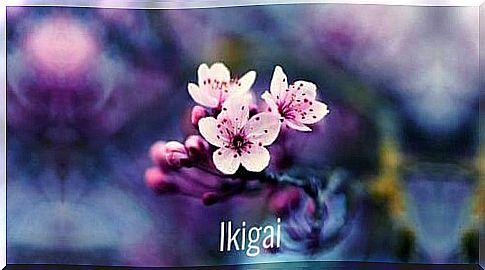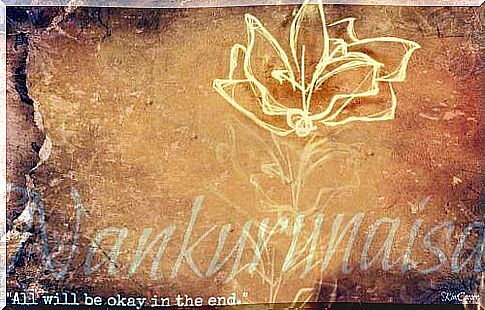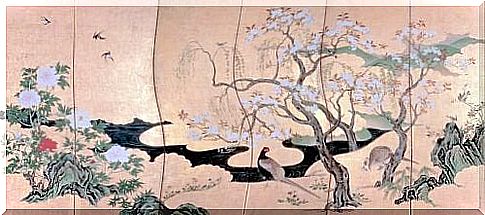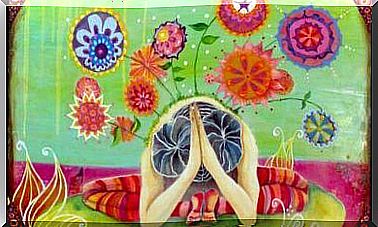7 Beautiful Japanese Words To Help With Personal Growth

As you learn foreign languages and words, you will discover how people in other cultures structure their surroundings, their perceptions of life, and even their own personal world.
Seven beautiful Japanese words
Japanese culture is known for certain terms that encompass a set of surprising and fascinating ideas for Westerners.
They invite you to reflect deeply on things and incorporate into your life certain concepts that promote change, personal growth, and an understanding of new perspectives. Above all, they contribute to cultural and spiritual enrichment.
In today’s article, we invite you to do this. We’re sure these words are as interesting to you as they are special.
1. Ikigai, the reason for existence
Everyone should have their own ikigai. It is a motive, purpose, illusion, or vital goal that gives strength and energy to start the day every morning.
As we well know, not everyone has found it yet. For this reason, some feel for a long time that they are lost without direction or motivation that will bring them real and concrete happiness.
This is an interesting concept that is definitely worth considering.
2. Kintsukuroi, wound healing with gold

The Kintsukuroi philosophy has a lot to do with perseverance. It is a subtle and precise skill that will allow you to heal your wounds and stand out as a stronger, more valuable and more beautiful person.
In Japanese culture, kintsukuroi refers to a technique for repairing broken pieces of porcelain. Instead of throwing the pieces away, the artists connect them together using a kit containing gold nuggets.
The cracks are visible as they are a testament to the power of a unique object that has its own story.
3. Aware, or grief about disappearance
Life moves fast and doesn’t wait for anyone. It is fleeting, fast-paced and unforgivable. Sometimes love ends and friendship goes out. Something that used to feel safe suddenly ends, forcing you to start over.
Within all of these processes is “ aware, ” one of the most superior words in the Japanese language. In it, grief is conveyed to the vanishing nature of things. This, in turn, conveys the need to move forward and close doors to open new ones.
4. Majime, a person who knows how to be responsible
In Japanese, “majime” literally means a serious person.
Rather than perceiving the word as a thorn to the closed and common essence of a person, it is, above all, a reference to his reliability.
5. Nankurunaina, one of the most beautiful words

Nankurunaa is undoubtedly one of the most beautiful words in ancient Japan.
It refers to the classic idea in motivational psychology, personal growth, and even spirituality that a person is encouraged to trust in the future.
Everyone has gone through adversity, so the only option is to trust.
You have to understand that the passage of time, as well as the soul and the will to act, correct everything and bring out new possibilities.
6. Gaman, withstand hardship with dignity
Gaman is another term directly related to the origins of Buddhism. It conveys a philosophy that helps to see life differently.
The word in question actually contains several ideas:
- Ability to self-control.
- Need to be patient.
- The ability to tolerate difficult and complex times.
- The ability to be tenacious and combine dignity and strength.
- The ability to overcome difficulties and strive to do something every day that makes you feel better.
“Gaman” also contains an idea that is both important and valuable: paying attention to others. You should not be a burden or a nuisance, but an understanding person who understands the people around you even when you live in the midst of your own problems.
7. Wabi-Sabi, the beauty of imperfection

Wabi-Sabi is another equally interesting term that includes aesthetics, art, and nature. However, it can also be applied to your own personal situation and daily psychology. It refers to the beauty that is in things that look imperfect.
In this way, it conveys the idea that truly beautiful things are simpler, cleaner basics, despite their small flaws or imperfections.
It is something you can apply in your daily life, ending the general obsession with the ideals of beauty and the pursuit of perfection in your life, in relation to your body, or even in your relationships.
These seven Japanese words are reminiscent of accepting that we are all flawed and beautifully imperfect.
Learn to apply these simple but interesting ideas of Japanese culture in your daily life.









